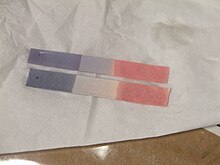Litmus test
In chemistry, the term litmus test describes a common test of the pH value of a substance with the help of the dye litmus (see also indicator ).
Outside of chemistry, the word is also used to define exclusion criteria or to justify directional decisions. In chemistry, however, a litmus test cannot be “passed”.
In English, a litmus test is a decision with a judgmental character that shows how a situation should really be classified. In the course of translations from English, this meaning appears more and more as Anglicism in German texts, a German eloquent equivalent would be a “ test stone ”. Example: The negotiations on the climate protection agreement are regarded as a “litmus test” (touchstone) of European-American relations.
Individual evidence
- ^ Brockhaus ABC chemistry. VEB FA Brockhaus Verlag, Leipzig 1965, pp. 781-782.
- ↑ Kai Biermann, Martin Haase: Linguistic lies, unwords and Newspeak from »atomic ruins« to »timely« . S. Fischer Verlag, 2012, ISBN 3-10-402397-2 ( limited preview in Google book search).
- ^ FAZ: Book by Gerhard Augst about educational vocabulary , accessed on November 28, 2019
